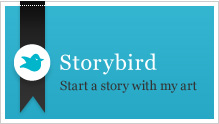Tracy introduced me a new website from scholastic for writing activity.
Scholastic Story Starters
The cute part is that the student get to write according to their luck. What I mean is they need to pull the lever of a wheel. From that they will get a mixed up match of things they need to write. For example, I got:
"write a suspenseful story about a babbling traveler who plays in an intergalactic football league".
If it sounds hard, I can just pull the lever again or change any part of the requirement, like instead of "who plays in an intergalactic football league" I got next "who lives on a space station".
Then I can choose in what format I want to write in. A notebook, letter, newspaper or postcard. I can insert pictures!
With that, I can start writing my article or essay or letter (depends on what the teacher wants - format that want to be learned).
The drawing however need to be scribbled. It has option like the paint only this one has less option. This might be, because they don't want problem with copyright pictures taken from other people websites.
Then when I am done I can either print it or even download it into my computer. From there, they can share it among themselves in edmodo.com.
I have not started yet. I will definitely soon because I have a lesson on writing a report. So most probably, for creative writing for introduction purposes I can use Story Starter to write a newspaper report. Then, I move on to a more formalised writing. The objective is for them to get cognitively ready for the real report writing.
Friday, August 30, 2013
Wednesday, August 28, 2013
Rubric on narrative writing.
As I remembered, I never had real writing lesson in my school days. If there was, not one that could stay vivid in my memory. Most of the time I felt like I was groping in the dark. I would usually use random grammar - anything that sounded right (I feel thankful I used to read a lot of story books when I was young) and made random sentence structure. I also wrote whatever that came in my mind first, never really about planning and how to make it purposeful. I made so many mistakes and I did not understand why I did them and how to fix it. I tend to get bored if I learn and revise something I already know, so I like fixing my weakness when revising. However, with English, I made little progress or none at all because I only see tick and squiggly lines here and there, some slashed out and certain times cross marks because I don't know why it is wrong. So I know now, in my class with my students, I cannot do what my teachers did back then.
I set writing activity for my students.
These are the criteria:
1. Narrative writing.
2. Based on pictures given (must use all in sequence) - I used Rumpelstiltskin pictures.
3. The story must be creatively designed different from the original version.
4. Organisation use good portion of each elements in plot: exposition, rising action, climax, falling action, resolution.
5. Good grammar and sentence structure.
I think this is what my students are facing; they are groping and they are bored with it. They know the form of the tenses during practice because it's practically a drill which is about doing the same thing over and over again. However, the practices are never about usage in various situation for writing and speaking. Then comes the sentence structure to convey their thoughts, they got the passive and active wrong and their direct and indirect speech is haywire too. To make things more complicated, they need to make the story pops out of page by using descriptive words and make descriptions vivid. In a nutshell, there are so many things to fix when writing and speaking a narration. They need formative and detailed comments on how they are doing.
Tracy advised in our training sessions to make feedback meaningful. This I highly agree. But how to go about this when there are so many students to attend to? If I need to go one student at a time it will take so much time and I don't even know if it's effective. Here, I am advised to use rubric. Use one that can show the criteria to get the perfect mark. Make sure to apply self-reported learning (which enhances their reflective thinking in their studies) so that I can learn more of the students' understanding and expectation of their work. Through the rubric they know what more they can do.
This is the plan we discussed:
1. Introduce the rubric and the perfect criteria to get perfect marks.
2. Let them do the writing, to practice the new information.
3. Get the student to mark their own work. This gets them to analyse the level of strength and weakness. This also get them cognitively prepared to change their initial input with new ones once they know they are weak in the targeted area.
4. Then, I give them the mark. If there is a gap, the students can get to know my real expectation and the things they should do; in further details. I can get them to in sync their expectation with mine.
The rubric can be a bit overwhelming because of the criteria are explained in tiny details. Yes it is student-friendly, but it won't help them if they see it as too much information. So I will:
1. introduce 2 criteria at a time. Each criteria has 5 points scale.
2. introduce the 5th point scale first to set their mind on the type of excellent work I am looking for.
I am hoping the students can come forward and debate with me about their marks. That way, I can get more information about their individual writing tendency and they can get to fix their weakness.
This is my rubric: Narrative Writing 5-point scale Rubric - student friendly
Tuesday, August 27, 2013
storybird.com helps students to improve writing!
It has been more than a month since I put in any entry, however today I would like to report on a very positive progress that my students have made.
I have a student I teach since he was in Form 1 (that is 7th grade). Up until the middle of Form 2 (recently), his writing would usually achieve below 60%. I introduced storybird.com and I noticed he did his assignment. His work did not exceed my expectation. He made the usual errors and the organization is not very well arranged.
However, we had August Formative Test 2013 last two weeks. His work is among the good works! His grammar has improved drastically - making only minor or not-so-obvious ones. The progress went uphill with a very steep cliff.
I am very surprised.
These are my assumptions on how the improvements happen.
1. He has study group that helped him to catch up with his work.
2. He analysed his weaknesses and act upon it.
How does storybird.com and the usage of internet devices helped him?
I am certain it helped him by making lesson interesting again. To be in this school (KYSM, Malaysia), one has to go through 3 level of assessment that test on all of your skills. This student got through. The bad marks and the late hand-in assignment is because of his lack of interest. By using Edmodo, virtual classroom, e-learning and new experience in lessons made him intrigued and most probably sparked his desire to listen again.
Here are his marks on writing tests since the start of the year:
3.4/ 10 for descriptive writing
4.7/ 10 for recounting incident
8.4/ 10 for story-telling based on pictures with moral values!
Now, to tell a story a student need to be very descriptive and able to recount incident/ situations well. So he did well on both combinations. In fact, he outdid some of the good students (who did not manage to finish their short story in an hour).
I feel my chest inflated because I can see a very positive development in him. I hope he keeps up and most of all I hope I can still provide a better, meaningful and interesting lessons for the students.
I have a student I teach since he was in Form 1 (that is 7th grade). Up until the middle of Form 2 (recently), his writing would usually achieve below 60%. I introduced storybird.com and I noticed he did his assignment. His work did not exceed my expectation. He made the usual errors and the organization is not very well arranged.
However, we had August Formative Test 2013 last two weeks. His work is among the good works! His grammar has improved drastically - making only minor or not-so-obvious ones. The progress went uphill with a very steep cliff.
I am very surprised.
These are my assumptions on how the improvements happen.
1. He has study group that helped him to catch up with his work.
2. He analysed his weaknesses and act upon it.
How does storybird.com and the usage of internet devices helped him?
I am certain it helped him by making lesson interesting again. To be in this school (KYSM, Malaysia), one has to go through 3 level of assessment that test on all of your skills. This student got through. The bad marks and the late hand-in assignment is because of his lack of interest. By using Edmodo, virtual classroom, e-learning and new experience in lessons made him intrigued and most probably sparked his desire to listen again.
Here are his marks on writing tests since the start of the year:
3.4/ 10 for descriptive writing
4.7/ 10 for recounting incident
8.4/ 10 for story-telling based on pictures with moral values!
Now, to tell a story a student need to be very descriptive and able to recount incident/ situations well. So he did well on both combinations. In fact, he outdid some of the good students (who did not manage to finish their short story in an hour).
I feel my chest inflated because I can see a very positive development in him. I hope he keeps up and most of all I hope I can still provide a better, meaningful and interesting lessons for the students.
Subscribe to:
Posts (Atom)







